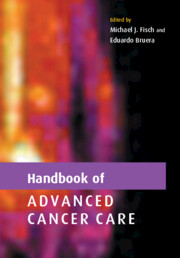Book contents
- Frontmatter
- Contents
- List of contributors
- Preface
- Acknowledgements
- PART I General concepts in oncology
- Part II Primary tumors
- Part III Management of specific symptoms and syndromes
- 41 Assessment of pain
- 42 Drugs for managing cancer pain
- 43 Difficult pain management problems
- 44 Dyspnea
- 45 Loss of appetite and weight
- 46 Fatigue
- 47 Depression and anxiety
- 48 Delirium
- 49 Constipation
- 50 Palliation of fever and sweats: the heat is on!
- 51 Bleeding in advanced cancer patients
- 52 Thrombosis
- 53 Hypercalcemia of malignancy
- 54 Lymphedema
- 55 Wound care of the advanced cancer patient
- 56 Infections in patients with advanced cancer
- 57 Urogenital complications
- 58 Brain metastases
- 59 Bowel obstruction
- 60 Bone metastases
- 61 Meningeal cancer
- 62 Pleural and pericardial effusions
- 63 Superior vena cava syndrome
- 64 Chronic nausea
- Index
- References
46 - Fatigue
Published online by Cambridge University Press: 04 August 2010
- Frontmatter
- Contents
- List of contributors
- Preface
- Acknowledgements
- PART I General concepts in oncology
- Part II Primary tumors
- Part III Management of specific symptoms and syndromes
- 41 Assessment of pain
- 42 Drugs for managing cancer pain
- 43 Difficult pain management problems
- 44 Dyspnea
- 45 Loss of appetite and weight
- 46 Fatigue
- 47 Depression and anxiety
- 48 Delirium
- 49 Constipation
- 50 Palliation of fever and sweats: the heat is on!
- 51 Bleeding in advanced cancer patients
- 52 Thrombosis
- 53 Hypercalcemia of malignancy
- 54 Lymphedema
- 55 Wound care of the advanced cancer patient
- 56 Infections in patients with advanced cancer
- 57 Urogenital complications
- 58 Brain metastases
- 59 Bowel obstruction
- 60 Bone metastases
- 61 Meningeal cancer
- 62 Pleural and pericardial effusions
- 63 Superior vena cava syndrome
- 64 Chronic nausea
- Index
- References
Summary
Introduction
Fatigue and asthenia are present in some extent in 70–90% of patients with advanced cancer., Nevertheless until now this symptom has been widely neglected by clinical attention and by research, for several reasons:
It is not reported by patients because they accept it as inevitable.
It is therefore not identified by the physician, since it is not visible.
Even if it is identified it is not therapeutically addressed.
Fatigue and asthenia are usually inseparably associated with the tumor by patient and caregiver. Since a well-trained palliative care team may be able to control frequent major symptoms such as pain, nausea or dyspnea, asthenia will become the most important cause of physical and psychosocial suffering.
Clinical features
The onset of fatigue may be one of the first symptoms and even precede the diagnosis of a malignancy. It may be present during the whole course of a disease and increase following anticancer treatments. However, in the palliative care setting it is usually not an issue for aggressive assessment or treatment.
Fatigue is a multidimensional symptom. It can be divided roughly into physical and mental aspects. Patients report muscle weakness and effort intolerance, in the meantime also a lack of motivation and interest, and difficulty in maintaining concentration. In a more advanced stage, patients do not start an activity since they know or fear that they will not be able to accomplish it. Other than in a physiological tiredness neither rest nor sleep may improve performance.
- Type
- Chapter
- Information
- Handbook of Advanced Cancer Care , pp. 374 - 381Publisher: Cambridge University PressPrint publication year: 2003



